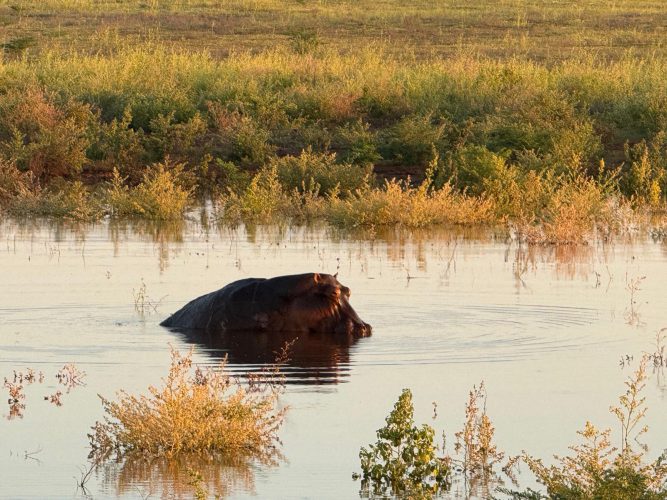It had been a few years since I last visited Zimbabwe, and my recent journey began with an overnight stay at Highlands House—a charming guesthouse just 30 minutes from the airport. Nestled in tranquil, beautifully landscaped gardens, it’s the perfect spot to relax and unwind before heading off on safari.
From there, we took a short flight to Mana Pools, a UNESCO World Heritage Site known for its four permanent watering holes that attract wildlife throughout the year. Our first night was spent at Zambezi Expeditions, a camp set directly on the banks of the mighty Zambezi River. There’s something magical about drifting off to sleep to the river’s soothing sounds, punctuated by the occasional soft thud of elephant footsteps through camp.
While April is slightly early in the safari season, the landscape was stunning and wildlife sightings were still rewarding. What makes Mana Pools particularly special is the variety of experiences it offers—game drives, canoeing, walking safaris, and fishing—a dream for nature lovers and adventure seekers alike.
We continued to Molori Mashuma, one of the newest camps in the area, for a night. This luxurious tented camp, located on a private concession within Mana Pools National Park, offers an exclusive and intimate safari experience. With only six beautifully designed tented suites and a setting overlooking the serene Mashuma Pan—about 45 minutes from the Zambezi—it’s an ideal place to immerse yourself in the wild while enjoying refined comfort and those thoughtful touches that elevate the experience.
We made a quick stop in at Nyamatusi Camp – which offers an ultra-luxurious yet eco-conscious safari experience. Set on the banks of the Zambezi River, the camp is framed by ancient forests and sweeping floodplains, where wildlife roams freely and the rhythm of nature sets the pace.
The camp’s six spacious tented suites are designed to blend seamlessly into the surrounding landscape. Each suite features floor-to-ceiling glass doors, private plunge pools, and uninterrupted views of the river and escarpment beyond. It’s the perfect place to unwind between activities while still feeling fully immersed in the wild.
Lake Kariba and Matusadona National Park
Our journey continued to one of my favorite spots in all of Zimbabwe—Lake Kariba. As a teenager, I spent two unforgettable weeks here on a houseboat, so returning after all these years felt like a full-circle moment. This time, we had the pleasure of spending two nights at Fothergill Island, a truly special retreat nestled on the shores of Lake Kariba within Matusadona National Park.
Fothergill is a place where travel dreams meet the rhythm of Africa. Set either within the tranquil mopane forest or directly along the lakeshore, every suite includes a private outdoor deck, perfect for enjoying early morning bird calls, quiet siestas, or golden-hour views over Lake Kariba. Whether nestled among trees or overlooking the water, each suite offers peace, privacy, and a seamless blend of nature and comfort.
Days here were filled exploring the wilderness of Matusadona by game vehicle, on guided walking safaris, and on the water where we tried our hand at catch-and-release fishing. The boat cruise was a highlight for us, watching elephants along the shore, listening to the hippos grunt as the beautiful African sun set over the horizon. Lake Kariba truly offers a soulful connection to the wild heart of Zimbabwe.
Hwange National Park
Our final stop brought us to the heart of Hwange National Park, Zimbabwe’s largest game reserve and a haven for wildlife. The park is home to thriving populations of elephant, lion, leopard, cheetah, and the elusive African wild dog.
We stayed at the stunning Somalisa Camp, where elegant design is thoughtfully blended with the raw beauty of the bush. Somalisa offers a truly elevated safari experience. Guests can enjoy a drink at the stylish bar, relax in the serene lounge area, or take a dip in the plunge pool overlooking the famed Elephant Pool—a natural watering hole where elephants frequently gather for a drink, often just meters away from your perch. As night falls, the crackling firepit becomes the perfect place to share stories under the stars.
What sets Somalisa apart is its ability to bring you eye-level with elephants, offering unforgettable close encounters that are humbling and exhilarating all at once. It’s a fitting end to a journey that celebrates Zimbabwe’s wild beauty, rich culture, and warm hospitality.
For our last night in Zimbabwe, we had the privilege of staying at Linkwasha Camp, Surrounded by sweeping views and a peaceful waterhole, the camp is a sanctuary of space, privacy, and stunning design. Linkwasha’s nine expansive tented suites offer comfort and seclusion, each one positioned to overlook the waterhole—a favorite spot for buffalo, antelope, and often, herds of elephants. The main area opens onto tiered decks that spill down toward the camp’s pool.
We set out on game drives, encountering large prides of lion and even catching sight of cheetahs moving stealthily through the grasslands. One of Hwange’s unique features is the railway line that still runs through the park. You can also have the experience of the Elephant Express, a charming and unconventional way to enjoy game viewing along the rails—an experience that adds a touch of nostalgic adventure to the safari.
Contact us to book your own adventure in Zimbabwe!
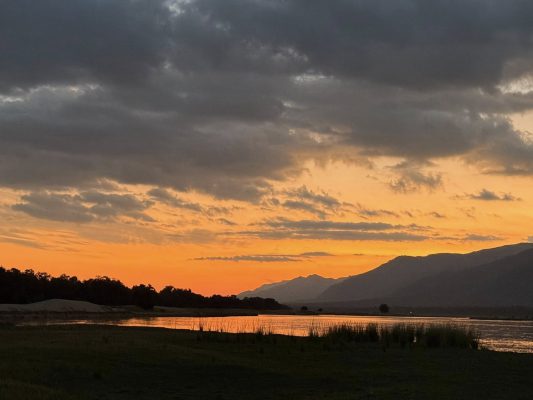
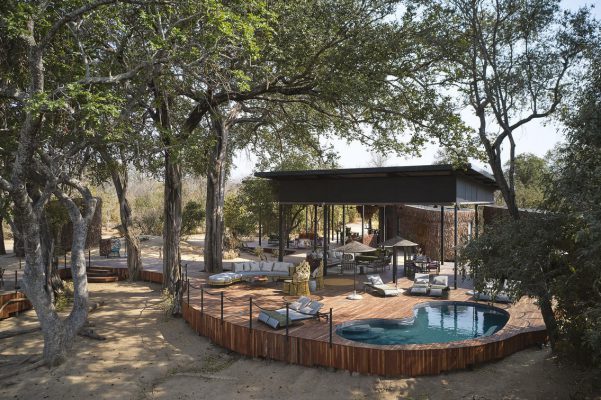
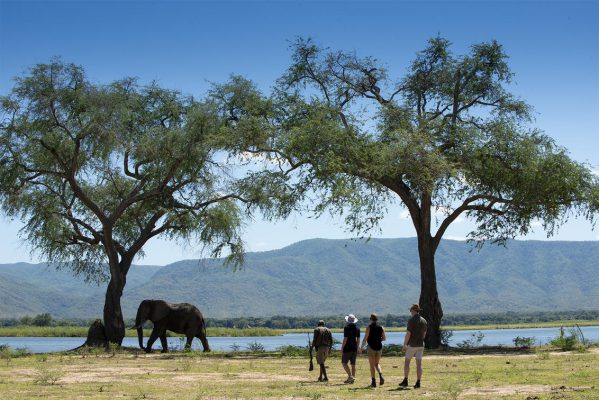
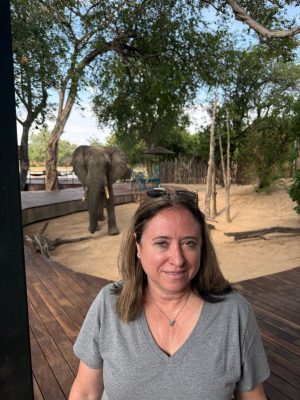
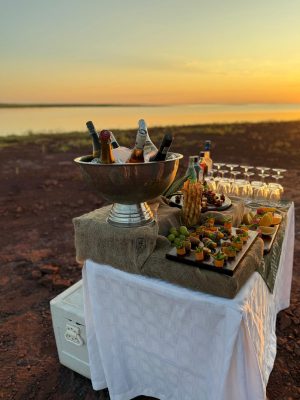
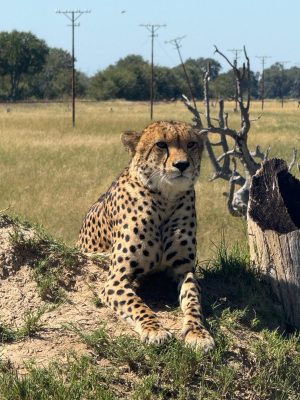
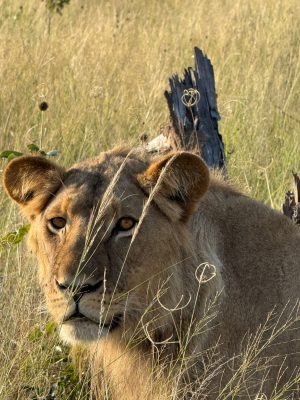
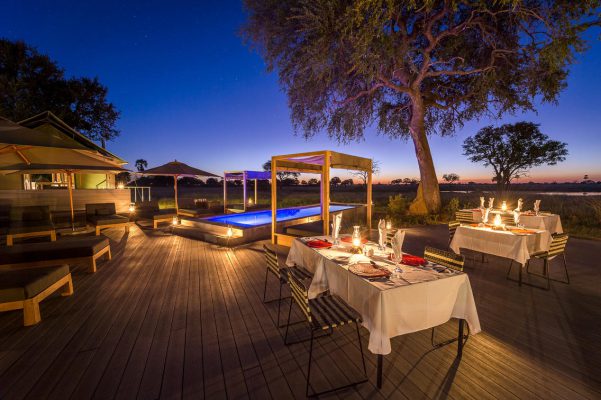
Note about our visit with Africa National Parks
We had the privilege of stopping in at the African Parks offices while in Kariba, where we met with Mike Pelham who joined African Parks as the Field Operations Manager in Matusadona National Park, a position he held for a year before being promoted to the Park Manager in May 2023. Mike is a qualified Zimbabwe Professional Guide and has worked in the conservation sector for over 17 years. Mike’s dynamic and varied repertoire of commercial leadership positions and unique love and experience of Zimbabwe’s wild spaces, grants the park with a leader well positioned to lead its resurgence.
African Parks is a non-profit conservation organization that takes on responsibility for the long-term management of protected areas in partnership with governments and local communities. African Parks manages 23 protected areas in 13 countries covering over 20 million hectares in Angola, Benin, Central African Republic, Chad, the Democratic Republic of Congo, Ethiopia, Malawi, Mozambique, the Republic of Congo, South Sudan, Rwanda, Zambia and Zimbabwe.
The organization was founded in 2000 in response to the dramatic decline of protected areas due to poor management and lack of funding. African Parks utilises a clear business approach to conserving Africa’s wildlife and remaining wild areas, securing vast landscapes and carrying out the necessary activities needed to protect the parks and their wildlife. African Parks maintains a strong focus on economic development and poverty alleviation of surrounding communities to ensure that each park is ecologically, socially, and financially sustainable in the long-term.
Their goal is to manage 30 parks by 2030, the geographic spread of protected areas and representation of different ecoregions makes this the largest and most ecologically diverse portfolio of parks under management by any one NGO on the continent.
In Matusadona National Park, the movements of elephant collared in 2021 have proved conclusively that seasonal dispersal is still functioning through several surprisingly intact corridors first identified by researchers in the 1990s.
There has been a noticeable reduction in illegal hunting and fishing thanks to effective park protection through conservation law enforcement and community engagement
With revived fish stocks, the legal fishing camps have become a major financial benefit to communities, as fishermen are able to access protected commercial fishing grounds.
A Temminck’s ground pangolin research and monitoring project was established in collaboration with the Tikki Hywood Foundation (THF).
The Reading Around the Reserve Program in collaboration with Book Aid International reaches 13,000 children a year. Of Matusadona’s employees, 62% hail from the four chiefdoms and 163 of 164 staff are local.
If you are traveling in an area where African National Parks operate and you want to visit a field office, let us know and we can try and set that up for your next safari adventure!
